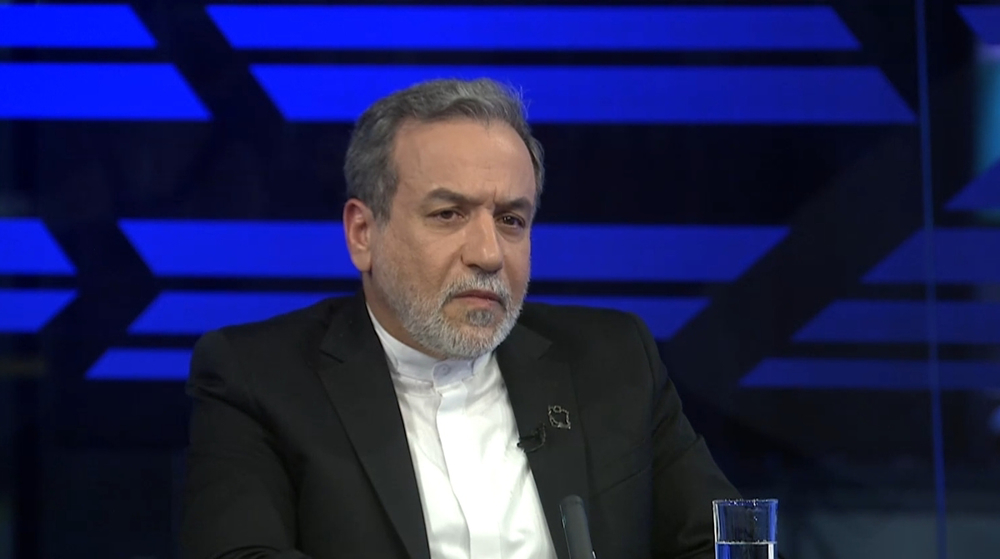Europeans lack determination, power to implement JCPOA commitments: Iran FM
Iran's Foreign Minister Mohammad Javad Zarif says a request by the British Middle East minister to delay the implementation of Europeans' non-dollar mechanism for trade with Iran shows their lack of genuine determination to abide by their commitments as per a 2015 nuclear deal with the Islamic Republic.
Zarif made the remarks on the sidelines of his tour of an exhibition on Monday when he was asked about Andrew Murrison’s request for the postponement of the European Union’s INSTEX mechanism -- officially called the Instrument in Support of Trade Exchanges -- during his recent visit to Tehran.
“Repeated delays with regard to the INSTEX [implementation] shows that Europeans neither have the power nor determination to implement their commitments [as per the nuclear deal with Iran, officially known as the Joint Comprehensive Plan of Action (JCPOA)], but we will continue our [reciprocal] measures on the basis of Article 36 [of the accord],” Zarif said.
US President Donald Trump pulled his country out of the JCPOA, reached between Iran and the five permanent members of the United Nations Security Council plus Germany, in May 2018 and re-imposed harsh sanctions against the Islamic Republic in defiance of global criticisms, leaving the future of the historic deal in limbo.
Critical of Washington’s move, the European parties to the JCPOA vowed efforts to keep the deal in place by protecting Tehran against the US sanctions, but did little in practice.
On the first anniversary of the US withdrawal from the nuclear deal, Iran announced that it would suspend the implementation of some of its commitments under the deal, adding that it would stop exporting excess uranium and heavy water, setting a 60-day deadline for the five remaining parties to the deal to take practical measures towards ensuring its interests in the face of the American sanctions.
In a meeting with Murrison in Tehran on Sunday, Kamal Kharrazi, who serves as the head of Iran's Strategic Council on Foreign Relations, took to task the European signatories to the nuclear agreement for failing to fulfill their obligations, vowing that the Islamic Republic would suspend more commitments if they do not act seriously as per the accord.
"Be sure that if the opposite side does not carry out an appropriate measure within the next two weeks, we will take more steps to stop implementing our commitments," Kharrazi said.
The three European signatories to the JCPOA -- the UK, France and Germany -- unveiled late in January the long-awaited direct non-dollar payment mechanism meant to safeguard their trade ties with Tehran following the US withdrawal from the nuclear deal and in the face of the "toughest ever" sanctions imposed by the United States against the Islamic Republic.
In its initial stage, INSTEX will facilitate trade of humanitarian goods such as medicine, food and medical devices, but it will later be expanded to cover other areas of trade, including Iran’s oil sales.
However, it has not resulted in any trade deals so far.
Read more:
- Russia will help Iran with oil, banking if payment channel not launched: Ryabkov
- Iran not happy with Europe on INSTEX as FM Maas visits
- Iran's FM Zarif criticizes Europe for delaying INSTEX launch
- E3 seriously working to operationalize INSTEX: UK, Germany
- Iranian official: Europe must end foot dragging on INSTEX to salvage JCPOA
Elsewhere in his remarks, Zarif said, “We have announced that whenever Europeans believe that they should pay a price for their security and carry out measures to fulfill their commitments, our [reciprocal] measures will be reversed."
Asked whether the Europeans would adopt a specific measure to launch INSTEX within the next two weeks, the top Iranian diplomat said, "This issue depends on whether Europe believes it should or should not take a measure."
"We believe that, at the present time, there are enough reasons for Europeans to take action. They must accept that if they fail to fulfill their obligations, they must get ready for its consequences," Zarif pointed out.
In his Sunday meeting with the British Middle East minister in Tehran, Iranian Deputy Foreign Minister for Political Affairs Abbas Araqchi said Iran is now convinced that the Europeans’ political unwillingness, and not their inability, is to blame for their failure to fulfill their commitments under the JCPOA.
“We are convinced that Europe’s lack of commitment to its JCPOA undertakings was not because of its incapability, but lack of determination," Araqchi said.
Iran seeks South Korea’s assistance for AI, fiber-optic projects
VIDEO | Iran's 'Eqtedar' (Power) maneuver
Israel hits HTS military target in Syria for 1st time since fall of Assad
VIDEO | Press TV's news headlines
Israel has slaughtered 13,000 students in Gaza, West Bank
VIDEO | More Zionist than Zionists: Biden’s legacy to be defined by Gaza genocide
Hamas confirms handing approval of Gaza ceasefire deal to mediators
VIDEO | Iran: Show of strength












 This makes it easy to access the Press TV website
This makes it easy to access the Press TV website